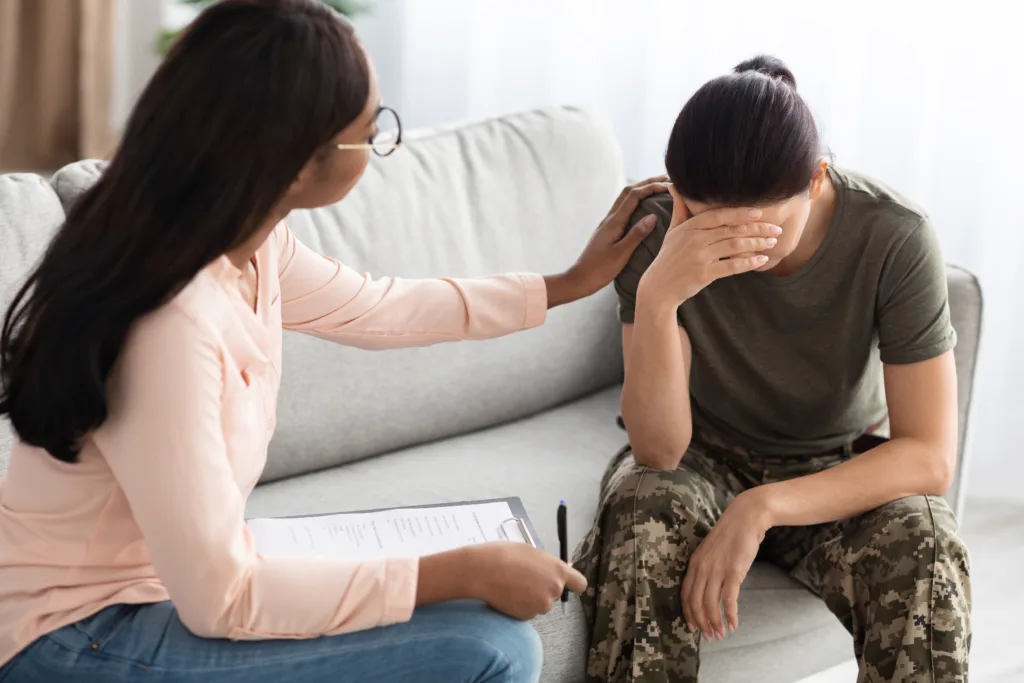Adjusting to Life Post-deployment

Nearly 250,000 service members transition to civilian life each year. While the initial reunion with friends and family may bring relief and happiness, the reintegration that follows can be challenging, confusing and come with unexpected difficulty and frustration. Not only are veterans readjusting to life outside of the structured and goal-oriented daily routines of the military, but they are often returning with challenges that require ongoing care, such as PTSD, physical injury, substance use and more. This can create a feeling of disconnect from their new life and from family and friends.
In a Pew Research Center survey of 1,853 veterans, 44 percent of post-9/11 veterans reported that re-entry to civilian life was difficult, and it also found that veterans who experienced emotional or physical trauma while serving are at the greatest risk of having difficulties readjusting post-deployment.
Daily Changes in Post-Deployment
For partnered service members, finding your role in the household after returning home may be difficult. Your partner has been handling the responsibilities of the household on their own during your deployment, and renegotiating shared duties and responsibilities may prove difficult for both of you. If you have children, they may have schedule changes you aren’t aware of, new friends or hobbies, and they may even be in a new grade or school since the last time you saw them.
For unpartnered service members, the sudden change in daily routines without an immediate support system may be isolating and lonely.
The military provided most necessities but with few options, and navigating sudden freedom and the responsibilities that go along with this freedom can be overwhelming at first. Even the freedom of eating whatever you want, when you want, can lose its charm!
It’s important to acknowledge that nearly everything you’ve come to expect in your daily life has substantially changed, and this shift requires patience, open communication with loved ones, care for yourself and time to adjust.
Co-occurring Complications with Reintegration
- PTSD: 13.5 percent of deployed and nondeployed veterans will develop PTSD. PTSD can negatively impact anything from self-view, interpersonal relationships, sleep, ability to remain employed and more, and it requires treatment from qualified professionals.
- Traumatic Brain Injury (TBI): A TBI sustained in combat can contribute to higher rates of binge drinking, opioid misuse and suicide. Symptoms of TBI often overlap with PTSD, and PTSD can develop after TBI.
- Other physical injuries: nine percent of vets report severe pain. Chronic and severe pain makes veterans vulnerable to prescription drug misuse, and other substance use disorders may interfere with interpersonal relationships, and the ability to care for one’s self and maintain employment.
- Substance use: In the wars in Iraq and Afghanistan, about 1-in-10 returning veterans have a problem with alcohol or other drugs. Alcohol is the primary substance for 65 percent of veterans entering treatment centers, nearly twice the rate of civilians.
Exiting service with any injuries or disorders complicates what may be an already-stressful adjustment to civilian life. Having a pre-departure care plan in place is vital so that the service member has a support system established when care is needed.
Strategies for Success
- Temper expectations. Just as it took some time to adjust to military life, it will take some time to readjust to civilian life.
- Set a schedule. Set a basic, daily schedule that includes physical and emotional nourishment, as well as things that bring you joy. This may include meal times, exercise, sleep, or time carved out for hobbies and socializing with friends and family.
- Arrange your support systems. Be honest with yourself about what you need and communicate these needs to your friends and family. This could include:
- Alone time
- A weekly gathering with extended family
- Setting boundaries with family and friends regarding discussing your experiences in combat
- Communicating with your loved ones about any frustrations you’re having with life post-deployment
- Communicating the things that are going well and that you appreciate
- Have professional support available. Professional support may include taking care of your mental health with a trusted therapist and having healthcare available to treat any physical injuries or chronic pain that you may have sustained during your service.
- Connect with other veterans. While family and friends may provide excellent support and love, they may not fully understand what it’s like to serve and to transition to life after service, and that’s okay. Connecting with other veterans can give you invaluable support and, in turn, you can provide support for someone else. Veterans Affairs has a list of national veteran service organizations here. You can also search for local veteran meet-ups and groups in your area.
- Get veteran-focused care. The Peer Support Program through the VA is a care program for veterans in recovery that employs a Peer Support Specialist, a veteran who is certified to assist other vets during their treatment and recovery from substance use, PTSD and more. Click here to learn more and find nearby programs.
- Connect with the VA. Get to know your benefits and transition support services offered through Veteran Affairs. The VA offers programs for pre- and post-separation and also has Transition Assistance Programs (TAPS) that offer financial and legal information, transition counseling and job assistance.
How Pyramid Can Help
Pyramid’s Military Therapy & Recovery Programs treat mental health disorders, substance use disorders and co-occurring disorders. Our team of providers creates an individualized treatment plan to meet your needs using a variety of treatment modalities. At our facility, located in Dallas, PA, we offer the peer support program throughout your initial treatment and into your extended recovery, ensuring you will always have the support you need.



